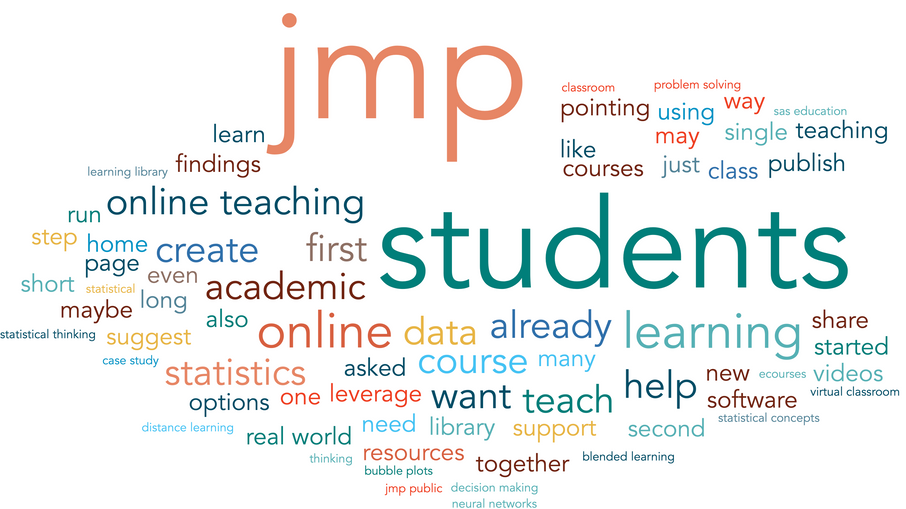Whether you were curious how to leverage options for online teaching in your class for a long time already, or if you are now asked (or even forced?) to teach your students from home: JMP has always been a great choice for Blended Learning, and we are expanding our distance learning support even more to help you with the transition from classroom to online teaching as much as we can.
We already covered “Self-paced learning and practice” in part 4 of our recent blog series on academic resources. However, this additional seventh article in the series should get you started by pointing you to the most useful resources supporting your statistics course. And don’t get us wrong: By “online teaching” we don’t mean just a virtual classroom where you present your slides over the internet. Instead, we want to suggest options to engage your students more and further improve their learning experience, while the lecturer enables and enjoys more active learning rather than delivering one-way presentations.

Here is our roadmap to integrate online support at different levels, which has been already adopted by hundreds of professors worldwide:
First, get your students started with JMP by pointing your students to “Learn the basics of JMP: Short videos & step-by-step guides”. Nine videos, together less than 30 minutes long, show new users how to get data into JMP, run first analyses or create powerful visualizations and share or publish results. That’s it! No software training needed, no book to read first, and most important: You will teach statistical concepts – no need to teach software.
Second, the 100 frequently asked questions will be answered by the JMP Learning Library – each answer on a single page, and most of them attached with a corresponding short video: “How to create interactive bubble plots?” “How to assess normality?” “How to run a two-sample t-test?” “How to bootstrap?” or “How to create neural networks?” – every how-to guide on a single page.
Third, when it comes to exercises or assignments, students typically can’t wait to explore and analyze real-world data sets to solve real-world problems. You will find many engaging examples in our Case Study Library. We also suggest that students get an opportunity to share their findings with the class in a live demo using JMP. Alternatively ask students to publish their findings online on JMP Public.
Fourth, you may offer your students access to the teaching modules and exams on STIPS, the free online course about “Statistical Thinking for Industrial Problem Solving.” This may help to refresh or consolidate knowledge from previous courses (for example, the module “Correlation and Regression” about basic statistics, or “Decision Making with Data” about statistical intervals and hypothesis tests). Or students can learn more about skills that are also essential in many workplaces today, like “Design of Experiments” or “Predictive Modeling and Text Mining.”

Are you thinking about the development of new courses using JMP, and maybe want to discuss the content of our Course Material Library together?
Are you interested in an online guest lecture, perhaps by an industry expert or by JMP staff?
Do you want to leverage one of the full JMP e-courses from SAS Education, or need a textbook?
Or do you have any deployment question or needs, like home use of JMP, or adding a second operating system or a server installation option to a license?
Please get in touch – the JMP academic team is here to help.
This is not just a workaround. We hope that your students will embrace – and that you will prefer – this modern way of teaching and learning statistics.
All the best to you and your classes,
The JMP Academic Team